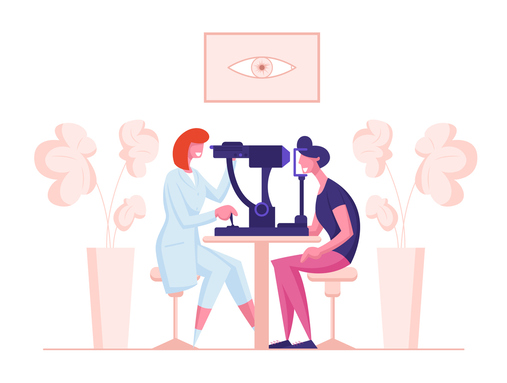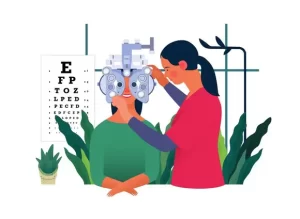Quick fire tips:
- Negotiate with Airbnb hosts. You can most likely get a lower price if you are staying longer
Look for cheap local student accommodations to save money. - Try not to mass apply to locations as a “backup”. It’s inconvenient to decline too many offers if you have applied for them.
Try not to mass apply to locations as a “backup”. It’s inconvenient to decline too many offers if you have applied for them - Some locations may be released later, so don’t be discouraged if you don’t get selected initially
- Going to a practice with a recent new grad can be helpful if you do want to work there to know what to expect
- Look out for interesting cases to write for your case reports and presentations. You can get a lot of assignments done during the six weeks
- Your externship mentors can also sign off your gonioscopy assignment. Perform them as much as you can during the externship
- If your store has an autorefractor, avoid relying on them for refraction. You won’t have one for exams!
- Check the weather in the area you are going to. Pack enough warm clothes!
- Don’t forget to relax and enjoy yourselves, since you have no holidays till the end of the year
In part five of optom, you will go on six weeks of externship in two practices, spending three weeks at each. You can also go to practices in Australia, but you must do the other one in New Zealand. The externships are unpaid and unfortunately, you need pay for your own flights, accommodation, and food. The application process for extern locations may vary year to year, so things I write may not be applicable in your year.
The externship coordinator will arrange a meeting with you for your preferred locations and review your CV in part four. She will send emails to your class of the available locations from different practices and some practices require a short paragraph of why you would like go extern there. The externship selection this year was quite chaotic and many locations came out much later due to updated externship contracts, but this issue will hopefully be resolved in the following year. Apply for practices that you don’t mind attending, as some students may reject offers hoping another practice accepts them.
You will generally see more pathology in regional practices compared to urban practices, but this may not always be the case. Externships in Auckland can be cost efficient since you can live at home. But if you are looking for something different or thinking to work regionally, I recommend you to attend a regional practice. You can get a taste of what work and life will be like and see if thats the path you want to pursue.
My experiences:
My first externship was in a corporate practice in Dubbo, a rural town in Australia. I probably went to the most inland and rural Australian practice out of the cohort, but I really enjoyed my experience. In my opinion, the key to enjoying your externship isn’t just the location (though it matters) but the people. My mentor and the other optometrists were always willing to help whenever I needed it. Regional patients are generally nicer, with some travelling hours from out of town to see us. The practice was always busy, so there were plenty of patients to see.
Over 13 days of testing, I conducted around 55 full eye exams and observed countless others. I was fortunate to always have my own testing room and saw patients whenever I wanted. One major takeaway from my externship was improving my communication with patients and explaining difficult conditions in simple terms. There are fewer things to do in rural regions, especially if you don’t have a car. Australian towns are generally larger than New Zealand, although the scenery is much better in New Zealand. The highlight of my trip was meeting other young optometrists in the region who often invited me to gatherings. My experience would not have been the same without them.
My second externship was at a corporate practice in Palmerston North. My flight from Auckland got cancelled, and I had to reschedule. Make sure you give yourself enough time to travel! My experiences at this practice were great. Though I saw fewer patients, my mentors sat in with every exam I performed, which was great for learning. My mentors focused heavily on pathology, and they routinely performed procedures such as gonioscopy. My mentors also reviewed referrals with me and discussed their train of thought when making clinical decisions.
I saw patients when there was a gap in the appointment book using one of the testing rooms. On average, I saw more than the minimum required two a day. The key takeaway from this externship was learning techniques such as corneal wedge and when to make referrals. I also got six gonioscopy sessions signed off by my mentors, making me much more confident at performing gonioscopy.
FAQ:
Will I get paid/reimbursed?
No, though Specsavers will reimburse $800-$1000 if you go regionally.
Scholarships?
Yes! There are regional scholarships available if you extern at regional New Zealand practices.
Stream 1 or 2? (no pun intended)
There are pros and cons for both. Stream one students MAY receive job offers earlier from their extern locations but may feel less prepared than Stream two students when attending their externship. Stream two students have less time to adapt to the university clinic before practical exams.
Will the store I extern at offer me a job?
Maybe. If you extern at an urban practice, e.g. Auckland, you are less likely to receive an offer than a regional/rural practice.
Do I have to extern at a place where I want to work in the future?
No, attending a practice doesn’t mean you have to stay there to work. You are not obligated to take any offers and don’t be pressured to do so.
Corporate or independent practices?
Independent practices generally have more speciality optometry, such as OrthoK, dry eye, pediatrics, etc. I didn’t attend any private practices, but my peers generally gave great feedback.
Can I find my own externship location?
You are free to contact other practices to see if they can take you for an externship. Templates are available on OPTOM561 on Canvas.
Do I need a Visa to go to Australia?
You don’t need a visa to go to Australia as a New Zealand citizen. As a non-New Zealand citizen, job hunting in Australia may be challenging as the company may have to sponsor your visa.
Does it get lonely in regional/rural?
Yes and no. The places I attended had people who took me around. If you don’t have a car then travelling can be difficult. You can attend with a friend at some locations.
Will my bank cards work in Australia?
Yes, your New Zealand Visa and paywave should work in Australia. Alternatively, you can also get a Wise card.
Is it competitive for jobs as a grad?
Depends on the location. Metro locations (Auckland, major Australian cities) are more competitive than regional locations. Some metro and independent practice offers come out later in the year, so don’t feel pressured to sign early.
Are the patients nice?
Yes! Most optometrists agree that regional/rural patients are nicer (especially in Australia).
What should I practice/focus on during externships?
My advice is don’t get lazy with your testing. Take your time and test as if you are in uni. Focus on the things you need more practice on. Ask your mentors LOTS of questions and advice!
How is Australian optom different from New Zealand?
In Australia, you can bill most exams under Medicare, meaning patients pay less/pay nothing at all for an eye exam.
Should I aim to see as many patients as I can?
Seeing more patients doesn’t necessarily mean you will learn more. Don’t burn yourself out since you will be attending the practice at least 5 days a week.



